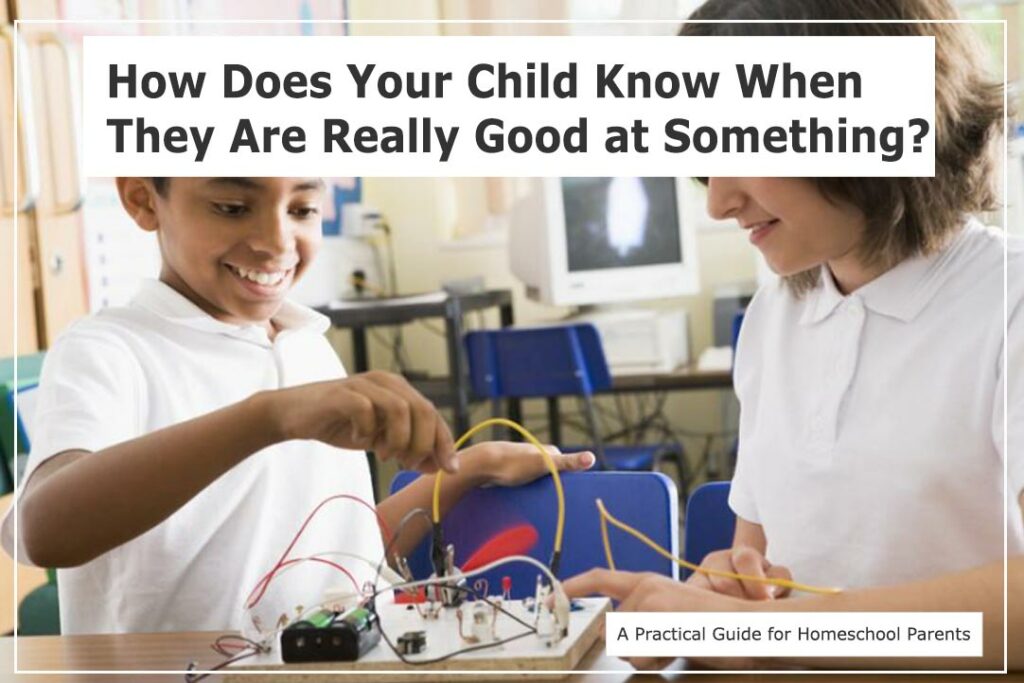How Does Your Child Know When They Are Really Good at Something?
A Practical Guide for Homeschool parents
As parents, we all want our children to feel confident in their abilities and proud of their accomplishments. But how do kids truly know when they’re good at something? It’s not just about getting gold stars or hearing praise—it’s about building an inner sense of confidence and understanding what success feels like from the inside out.
Here’s how you can help your child recognize their own strengths and grow their self-awareness, whether it’s in academics, sports, creativity, or everyday life.
1. Build Internal Confidence, Not Just External Validation
Kids often look to others—parents, teachers, or peers—for approval. While a little praise can be motivating, it’s essential to help your child develop internal confidence so they don’t always rely on external validation.
How to do it:
- Use “I notice” statements: Instead of always saying, “Great job!” try something like, “I noticed how much effort you put into that drawing,” or, “You worked really hard to solve that math problem.” This shifts the focus from pleasing others to recognizing their own effort.
- Ask reflective questions: Encourage your child to evaluate their own work with questions like, “What do you think went well?” or, “What would you do differently next time?”
2. Encourage Self-Assessment
Self-assessment is a key skill that helps kids understand their strengths and areas for growth. When children can honestly evaluate their own progress, they develop the ability to set realistic goals and celebrate their achievements.
How to foster self-assessment:
- Create checkpoints: Break tasks into smaller steps and ask your child to evaluate their progress along the way.
- Celebrate milestones: Focus on progress, not perfection. Help them recognize how far they’ve come, even if they’re not finished yet.
- Use visual tools: Charts, journals, or portfolios can help them track their progress over time.
3. Teach the Power of Practice
One of the most important lessons kids can learn is that being good at something takes time and practice. No one becomes a great athlete, artist, or scientist overnight. Emphasize that effort, persistence, and a willingness to learn from mistakes are what make people truly skilled.
Practical tips:
- Praise effort, not just results: For example, instead of saying, “You’re so smart,” say, “I’m proud of how hard you worked on that project.”
- Show examples of growth: Share stories of famous people (athletes, inventors, artists) who succeeded through perseverance.
- Model resilience: Let your child see you trying new things and learning from mistakes.
4. Help Them Recognize Feedback as a Tool
Constructive feedback can feel discouraging at first, but it’s one of the best tools for growth. Teach your child that feedback isn’t criticism—it’s a way to improve.
How to approach feedback:
- Make it specific: Offer clear, actionable suggestions, like, “Next time, try holding the bat this way,” instead of vague comments like, “You need to try harder.”
- Teach them to seek feedback: Encourage your child to ask for advice from teachers, coaches, or peers.
- Normalize mistakes: Let them know that errors are a natural part of the learning process.
There's something extra-special about a child that is teachable and coachable... they make a better fit on teams, in leadership positions, and are overall happier because they don't have the stress of always needing to be "right". They are also humble enough to learn from others that have mastered areas that they are still working on.
5. Celebrate Wins That Matter to Them
Kids are more motivated when they care about what they’re doing. Help your child identify what they’re passionate about and focus on goals that matter to them—not just what others expect.
Ideas for celebration:
- Personalize rewards: If your child loves art, reward their effort with a new set of markers. If they’re into sports, celebrate with a family outing to a game.
- Acknowledge growth: Instead of focusing on end results, recognize progress, like mastering a tricky piano piece or improving their spelling test score.
6. Teach Them to Share Their Skills
One of the best ways for kids to realize they’re good at something is by sharing their skills with others. Whether it’s helping a sibling, teaching a friend, or showcasing their talent, sharing builds confidence and reinforces their sense of mastery.
Ideas for sharing:
- Presentations: Encourage them to show off a project or skill at a family gathering.
- Peer teaching: Let them explain a concept they’ve mastered to a friend or sibling.
- Community involvement: Help them find ways to use their skills to contribute, like volunteering or joining a club.
7. Foster a Growth Mindset
Help your child understand that talent isn’t fixed—it grows with effort and learning. A growth mindset encourages kids to embrace challenges and see failure as an opportunity to improve.
Ways to cultivate a growth mindset:
- Use positive language: Swap phrases like, “I’m not good at this,” with, “I’m still learning this.”
- Praise persistence: Acknowledge when they stick with something, even if it’s tough.
- Reframe setbacks: Encourage them to see mistakes as “steps toward success.”
the bottom line
Helping your child know when they’re truly good at something isn’t just about pointing out their strengths—it’s about teaching them to recognize and trust their own abilities. By encouraging reflection, celebrating effort, and fostering independence, you’re setting them up to feel confident and capable in whatever they choose to do.
So, how does your child know they’re good at something? When they can say with confidence, “I worked hard, I learned, and I’m proud of what I did.”
What steps will you take today to help your child develop that inner confidence?
Just Enter Your Email To Receive
5 Free Hands-On Science Lessons!

Just enter your email and you’ll get instant access to this complete mini-science curriculum.
This free sample program includes:
See how easy it can be for you to go from “Frustrated” about not having enough time or resources for Science… To “Fascinated” by how your kids learn science better than EVER before because now they’re enjoying it!



